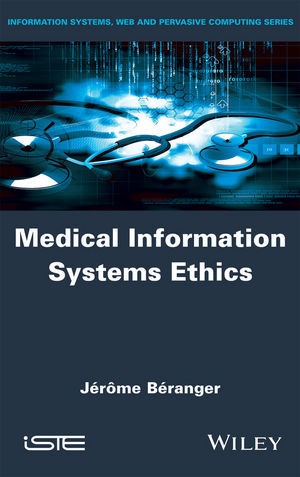Share
Fr. 159.00
Jer Me Beranger, Jérôme Béranger
Medical Information Systems Ethics
English · Hardback
Shipping usually within 3 to 5 weeks
Description
The exponential digitization of medical data has led to a transformation of the practice of medicine. This change notably raises a new complexity of issues surrounding health IT. The proper use of these communication tools, such as telemedicine, e-health, m-health the big medical data, should improve the quality of monitoring and care of patients for an information system to "human face".
Faced with these challenges, the author analyses in an ethical angle the patient-physician relationship, sharing, transmission and storage of medical information, setting pins to an ethic for the digitization of medical information. Drawing on good practice recommendations closely associated with values, this model is developing tools for reflection and present the keys to understanding the decision-making issues that reflect both the technological constraints and the complex nature of human reality in medicine .
List of contents
INTRODUCTION ix
CHAPTER 1. THE EMERGENCE OF MEDICAL INFORMATION IN THE FACE OF PERSONAL AND SOCIETAL ETHICAL CHALLENGES 1
1.1. An information-consuming society 2
1.2. e-Health, m-health, the Quantified Self and Big Data 5
1.3. Medical secrecy in the face of the computerization of healthcare data 18
1.3.1. Regulatory characteristics of medical secrecy 19
1.3.2. Protection of healthcare data 24
1.4. Cultural evolution of mentalities surrounding legitimacy of information 28
1.5. Processing of personal data in law 30
1.5.1. European regulations concerning the processing of medical data 32
1.5.2. American legal framework surrounding personal healthcare data 39
1.5.3. Laws pertaining to personal data in Asia 42
CHAPTER 2. ETHICAL MODELING: FROM THE DESIGN TO THE USE OF AN INFORMATION SYSTEM 45
2.1. Info-ethics: data on practical wisdom 47
2.1.1. Epistemological illumination around the pyramid of knowledge 48
2.1.2. From data to knowledge through an information system 52
2.1.3. Quality and choice of medical information 56
2.2. Identification of method used to develop the ethical analysis model 61
2.3. Development of the ethical analysis space 68
2.4. Presentation of the ethical model 74
2.4.1. Ethical cube of an accepted contingency 75
2.4.2. Ethical model of information system in the doctor-patient relationship 78
2.4.3. Ethical modeling of medical communication 88
2.4.4. Process of creation of practical wisdom via neo-Platonic systemic ethical modeling 95
2.4.5. Ethical inductive algorithmic governance (Psi, G, Phi) 108
2.4.6. Toward a selective ranking of medical data 113
CHAPTER 3. USES OF THIS ETHICAL MODEL 119
3.1. Implementing the ethical model 119
3.1.1. Implementing the model on the major aims of an information system 121
3.1.2. Implementation of the model in the general creation of an information system 131
3.2. Presentation of the study's questionnaires 131
3.3. Necessary environmental changes for healthcare information systems: recommendations and actions 134
3.3.1. From a structural and technological perspective 137
3.3.2. From a strategic and methodological perspective 141
3.3.3. From an organizational and regulatory perspective 146
3.3.4. From a relational and cultural perspective 153
3.4. Creating an ethical charter on the "ideal" computational tool for a healthcare establishment 158
3.4.1. Missions and areas of action 158
3.4.2. Contents 160
CHAPTER 4. ETHICS-ORIENTED PERSONALIZED MEDICINE 165
4.1. The evolution of society toward an ethical ideal based on information 166
4.2. The doctor-patient-IS triangulation 174
4.2.1. Man-machine interface 175
4.2.2. Data compression 178
4.2.3. Flexibility and technical adaptation to the users 180
4.2.4. Shared knowledge engineering 182
4.3. Ethical use of an information system in healthcare 184
4.4. Ethics-oriented personalized medicine 189
4.4.1. Value of management 190
4.4.2. Ethical management 191
4.5. Tool for the establishment and constant improvement of information systems for ethical practice in hospitals 194
4.5.1. Construction of the dashboards 195
4.5.2. Methodology of implementation and use 212
CONCLUSIONS 221
APPENDIX 1 225
APPENDIX 2 229
APPENDIX 3 233
APPENDIX 4 235
APPENDIX 5 243
APPENDIX 6 245
BIBL
About the author
Economist and health manager, Jérôme Béranger is a senior consultant and associate researcher (PhD) for Keosys society. His research focuses on ethics and sociology of information systems for e-health, m-health and big data.
Summary
The exponential digitization of medical data has led to a transformation of the practice of medicine. This change notably raises a new complexity of issues surrounding health IT.
Product details
| Authors | Jer Me Beranger, Jérôme Béranger |
| Publisher | Wiley & Sons |
| Languages | English |
| Product format | Hardback |
| Released | 31.01.2016 |
| EAN | 9781848218598 |
| ISBN | 978-1-84821-859-8 |
| No. of pages | 300 |
| Dimensions | 159 mm x 240 mm x 22 mm |
| Weight | 602 g |
| Subjects |
Guides
Natural sciences, medicine, IT, technology > IT, data processing > IT Informatik, informationstechnologie, computer science, Information Technologies |
Customer reviews
No reviews have been written for this item yet. Write the first review and be helpful to other users when they decide on a purchase.
Write a review
Thumbs up or thumbs down? Write your own review.

